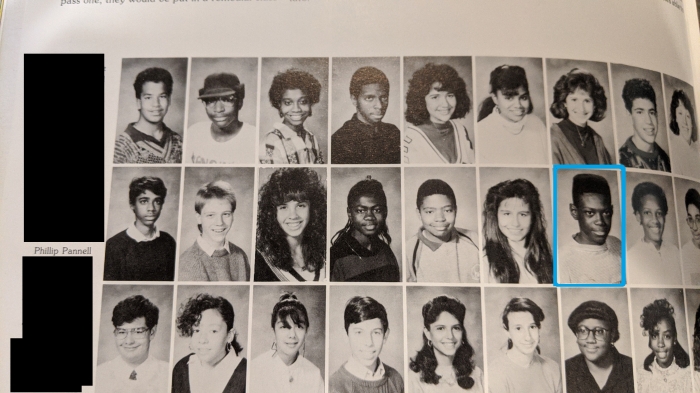Structural Racism
@PVW Nicely done.
The racism we experience is systemic, as in a phenomenon relating to and influencing the entirety of a system. In our case, American institutions have a foundational racial component that reserves a different set of requirements and subsequent outcomes for 'non- white' people. Observing the operation of these institutions and the overall effect they have on Black and brown Americans is observing systemic racism.
Excerpted from an audio interview with Ta-Nehesi Coates:
"Racism was put in place by a series of laws. Racism is responding to an actual condition that is not natural.” Looking back to colonial Virginia, Coates traced the institution of indentured servitude as paving the way to slavery, and ultimately to systemic racism. When slavery became the dominant form of labor, he said, “racism came slowly, racism came with the need for a bonded labor force.” So if “racism is all about power,” and not simply a “moral stain,” then “there isn’t any reason why we have to be this way,”
“The evidence of us as a dual society is so overwhelming and clear, yet we take great effort avoiding it,” he said. The wealth gap between whites and blacks is staggering, he said, and “African-Americans are still the most segregated population in this country, the most segregated population that has ever been in history.”
What this means looking forward, is that “as long as we’re okay with a dual society, as long as we’re okay with…doing nothing about the fact that black America is a second society, Trayvon Martin will happen,” he said, “and when it does happen, no one should act surprised.”
https://shorensteincenter.org/ta-nehisi-coates/
Obviously you could advance or retreat in time and replace Trayvon Martin with any number of names from George Stinney or Emmett Till to Breonna Taylor or Elijah McClain and this idea about the perils of a dual society would remain the same.
I think recognizing an alternate society humming along right beside you is a difficult thing for many people. It's much easier to recognize individual acts of hatred or prejudice, but the quiet persistent thrum of low expectations for middle schoolers or higher-risk mortgages for their parents is harder to spot.
What a superfluous bump that was.
In a related thread, a tweet purported to match the higher rate of Black victims of police killings to a higher rate of Black perpetrators of violent crime. (“Data!”) The careless conflation of arrests with perpetrators aside, that’s an argument that tries to debunk one result of systemic racism with other results of systemic racism. It doesn’t fly.
Excerpt from a document entitled "What is Systemic Racism?" by a bunch of wild-eyed socialist radicals -
Data on social and economic welfare show disparities between many persons of color and their white counterparts.
• Unemployment rates for Africans Americans, Latinos, and Native Americans are considerably higher than the national average. Growing income inequality increasingly affects minorities.
• In the United States, median wealth for white households is ten times greater than for black households, and eight times greater than for Hispanic households.
• Minority homeownership rates lag behind their white counterparts, and yet research shows that minorities face extra hurdles in getting approved for mortgages.
• African Americans, Latinos, and Native Americans are disproportionately affected through every stage of the criminal justice system, despite the evidence that different racial and ethnic groups commit crimes at roughly the same rates.
DaveSchmidt said:
What a superfluous bump that was.
In a related thread, a tweet purported to match the higher rate of Black victims of police killings to a higher rate of Black perpetrators of violent crime. (“Data!”) The careless conflation of arrests with perpetrators aside, that’s an argument that tries to debunk one result of systemic racism with other results of systemic racism. It doesn’t fly.
absolutely. It's not news that persons of color, especially Black persons in the U.S. have far more interaction with law enforcement than white people. The system is set up for law enforcement to have a greater presence in Black neighborhoods, and detain people more often. In New York, a city that has been quite safe for many years, Black people were being stopped by the police constantly.
flimbro said:
Obviously you could advance or retreat in time and replace Trayvon Martin with any number of names from George Stinney or Emmett Till to Breonna Taylor or Elijah McClain and this idea about the perils of a dual society would remain the same.
How did I miss Elijah McClain? Perhaps I blocked it out because I'm familiar with the torture. Not the physical torture they first did to him which made him vomit -- but the Ketamine sedation. They had to toss him down the K-hole into psychological dissociation and give him a heart attack and brain death? After he said this?
I can't breathe. I have my ID right here. My name is Elijah McClain. That's my house. I was just going home. I'm an introvert. I'm just different. That's all. I'm so sorry. I have no gun. I don't do that stuff. I don't do any fighting. Why are you attacking me? I don't even kill flies! I don't eat meat! But I don't judge people, I don't judge people who do eat meat. Forgive me. All I was trying to do was become better. I will do it. I will do anything. Sacrifice my identity, I'll do it. You all are phenomenal. You are beautiful and I love you. Try to forgive me. I'm a mood Gemini. I'm sorry. I'm so sorry. Ow, that really hurt! You are all very strong. Teamwork makes the dream work. Oh, I'm sorry, I wasn't trying to do that. I just can't breathe correctly.
According to body cam audio, these were McClain's last words as he was restrained by police officers.
A medic injected Elijah with a Ketamine dose for a 220lb person -- but he was 5'6" tall, and barely weighed 140lbs soaking wet.
Drug dealers selling Special K at raves in the 90's were more responsible with this unpredictable and dangerous drug.
Here's what a K-hole does for those who didn't come of age around it:
https://www.healthline.com/health/k-hole#what-it-feels-like
And Elijah's wikipedia page:
https://en.wikipedia.org/wiki/Death_of_Elijah_McClain
Apparently Colorado police are requesting medics to simply inject handcuffed people with this controlled substance, which acts like PCP/Angel Dust on the mind, and results in loss of control of the body.
https://www.cnn.com/2020/08/31/us/ketamine-use-in-police-stops/index.html
This brings back recollections from the 90's, which gives rise to another name, Abner Louima.
George Stinney was 14 in 1944 when he was sent to the electric chair for a double murder he didn’t commit. The trial lasted two hours and the jury deliberated for 10 minutes. No physical evidence only a coerced confession. He was found guilty.
He weighed 90 lbs- too small for the restraints on the chair- so they sat him on a Bible (his bible) and then killed him.
In 2014 he was exonerated by the state of South Carolina.
Anyone see that chilling movie Get Out? The k-hole experience echoes parts of it.
Phillip Pannell as a freshman, in my high school yearbook. The following year (1990), an officer shot him in the back when his hands were raised.
https://en.wikipedia.org/wiki/Shooting_of_Phillip_Pannell
[ETA: A friend of mine is working on having a mural put up in his name, as well as in the name of many others who are listed at the end of this article.]
https://patch.com/new-jersey/teaneck/teaneck-black-lives-matter-mural-could-honor-phillip-pannell
On the broader topic of seeing things at a structural, systems level, I'd recommend the classic book Thinking in Systems by Donnella Meadows. It's a clear, accessible introduction to a systems way of looking at the world. Nothing specifically about race in that book, but the mental tools it introduces are empowering for thinking about a wide range of topics, including systemic racism.
This could either develop into an interesting discussion on systemic racism... or encourage other institutions to pretend that systemic racism doesn't exist:
Dept. of Education launches probe after Princeton president acknowledges systemic racism at the University:
The U.S. Department of Education has launched an investigation into Princeton University after its president acknowledged that systemic racism is “embedded” in the university’s structures.
The department informed Princeton of the investigation in a letter Wednesday, citing Princeton University President Christopher Eisgruber’s open letter earlier this month discussing the school's efforts to address systemic racism.
Officials said the university “repeatedly represented and warranted to” the department that it was complying with nondiscrimination mandates under Title VI of the Civil Rights Act of 1964, but asserted that Eisgruber in his letter had admitted the university is “racist.”
Original sources:
- From Princeton: An update and overview of Princeton University’s ongoing efforts to combat systemic racism
- From US Dept of Education: Princeton University’s Admissions of Racism/Potential Violations of
Prohibitions Against Substantial Misrepresentation Arising from
Nondiscrimination and Equal Opportunity Assurances
https://www.princeton.edu/sites/default/files/documents/2020/09/Princeton-Letter-9-16-20-Signed.pdf
- Initial response from Princeton: University statement on U.S. Department of Education letter regarding nondiscrimination practices
sprout said:
This could either develop into an interesting discussion on systemic racism... or encourage other institutions to pretend that systemic racism doesn't exist:
Dept. of Education launches probe after Princeton president acknowledges systemic racism at the University:
It's DeVos overseeing the Education Department for Trump. They're weaponizing laws against discrimination, to chill any mention of systemic racism.
Yes, that is the Trump Administration's purpose.
I'm curious to see if Princeton is as brilliant as it thinks it is, and can instead outsmart them and use this as an opportunity to clarify the difference between discrimination and systemic racism. Perhaps develop useful means for identifying each that can become recognized by law, and inform their remedies.
That said... based on a previous discussion on systemic racism with someone near the top of the Princeton administration, it's likely Princeton will just go for a CYA approach...
Among the many layers of this dark joke is that years of systematic racism almost certainly did not break any laws.
Rentals
-
Huge Brand New construction Apartment in 2 family home with 4 bedrooms 3 bathrooms
4 Bd | 3Full Ba
$4,500




















One thing that took me quite a bit of time to wrap my head around was this idea of systematic or structural racism. Structural issues aren't always intuitive or easy to see -- we're accustomed to thinking about individual actions and intent. So someone in a KKK suit yelling racial slurs we can clearly identify as acting racist. But if we come across the argument that, for instance, police violence against black people is a manifestation of structural racism, that's not necessarily so easy to see. We see responses like "I'm against police brutality, but what does that have to do with race" or "there's no evidence that there was any racial motivation."
Those kinds of response are talking past the issue of structural racism, as they are still focusing on individual actions. If a house is sloped to one side, and you put a marble on the uphill end, the marble will roll downhill. If we had magic powers and made that marble sentient it would still, all things being equal, roll downhill. The question of whether the marble actively chose to go downhill would be largely beside the point. In fact, the only way for the marble not to roll downhill would be to either make changes so the floor was no longer sloped, or for our sentient marble to actively resist the downhill pull.
Our society has strong biases against non-white people built in. It's obviously bad when individuals are explicitly, actively racist, but even if someone is just neutral on racial issues the outcomes will end up to the detriment of people of color. To have substantially different results on the individual level, it's not enough to simply not be racist, one must actively resist the racism built into our society. And to really fix things, we have to fix the leaning structure.
To make this more relatable, here's some concrete examples. This is from an article in the Washington Post, "The black-white economic divide is as wide as it was in 1968"
That's right -- the median household wealth for white housesholds is nearly $150,000, but for Black households it's barely $13k. That obviously has a hold host of implications for the present moment -- who is most vulnerable to the coronavirus, where people can afford to live, what school their children can go to... and, given that this is a time series graph, it's quite clear that something is holding down the growth of black wealth while white wealth continues to grow.
Here's an example of what this something looks like in practice. This, from the NYT:
Black Homeowners Face Discrimination in Appraisals
You can read the details in the article, but the gist of it is that homes owned by Black households, even when those homes are in the same neighborhoods as white people, are consistently appraised for less. Going back to the chart above, note that even for a black family to be owning a home in the same neighborhood as a white family already means they've overcome an enormous amount of headwinds to be able to aquire property and start building some wealth. But even getting to that point, they still find their ability to build up their wealth significantly suppressed compared to white families.
So when the discussion is, for instance, police violence, and someone points out that this is a manifestation of structural racism, this is the context. The police are biased toward the protection of property, and the rights of property owners. Our country severely suppresses the ability of black people to acquire, maintain, and build wealth. Unless and until that changes, it actually doesn't much matter if an individual police officer was acting with "racial motivation" or not, the outcome is a perpetuation of systematic racism. Our collective house is severely askew, and the first step to fixing this is to notice and acknowledge this.